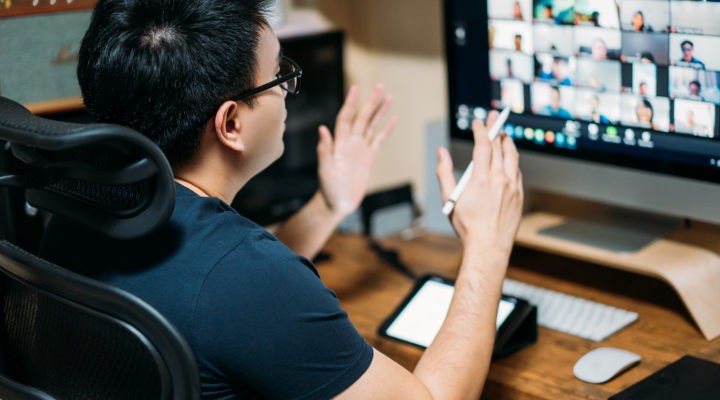During this pandemic, churches, schools and organizations have been forced to learn and use new approaches to worship, ministry and learning. We are creatures of habit, but habits can limit our perspective.

David Cassady
As Baptist Seminary of Kentucky began offering theological education through distance learning, we found new perspectives and opportunities. I share this story in the hope that it might help congregations to see promise and opportunity as they look toward a rapidly changing future.
New challenges lead to innovation
BSK’s journey into distance education began with an interest in racial justice, rather than as a reaction to the pandemic. In 2018, we began offering the full master of divinity degree program in West Louisville — the first graduate program in this predominantly Black part of the city. Simmons College of Kentucky, an HBCU located in West Louisville, invited us to this work and provided classroom space and humbling hospitality.
How could a seminary provide a full degree in a new location while also connecting our historically white Georgetown campus?
Our solution (funded by generous grants from the Baugh Foundation and CBF), was to set up state-of-the-art video conferencing systems in classrooms at both campuses. Each semester, students from both sites would take the same courses at the same time using these systems — building relationships and learning from the increased diversity.
Faculty alternated teaching, typically weekly, between the campuses. We were stunned as students asked professors to leave the systems running after class so they could talk about their families, their work, their churches. Our community formed friendships across the distance, and we experienced new perspectives.
Being in “Black space,” as Simmons College President Kevin Cosby calls it, transformed our culture and curriculum. We quickly discovered that the rich tradition of Black biblical scholars, theologians and history have been largely absent from much of theological education.
It also, unexpectedly, prepared us for the coming pandemic.
Changing perspective
The greatest challenge we faced was not technical, but in changing our perspective.
The old saying that “If all you have is a hammer, everything looks like a nail” expressed the way we saw distance education before our relationship with Simmons College. We understood how to teach “in person.” Could formation occur with distance education? Would students form meaningful connections with professors and fellow students? We had questions that revealed our interest in quality, but also our fear of the different.
“The greatest challenge we faced was not technical, but in changing our perspective.”
In 2019, we began the process of requesting approval from the Association of Theological Schools to provide the master of divinity program fully online. We received approval in 2020. Our spring 2020 semester began in both campuses as usual, connected by our “Zoom Rooms.” By March, however, we joined the ranks of schools shifting fully to distance education in order to protect our students, staff, faculty and communities.
Because we had earlier transitioned to a cloud-based Learning Management System and were already proficient in Zoom, our learning curve to fully remote teaching was much shorter.
We still had much to learn.
Relationships
The shift to distance education led us to give additional attention to relationships. Our faculty noticed the lack of commuting time to each campus and began using that time to connect directly with individuals. Almost all our students work full time, and the effects of the pandemic were difficult for many. We were able to provide care and flexibility for students because our faculty took the time to deepen relationships.
We also worked harder at keeping our faculty and staff connected. We started weekly Zoom “lunches.” (Yes, we eat in front of our laptops and catch up. Spouses and children are welcome). We were led to implement innovative prayer and chapel experiences — open to both our community and the public — that have continued across the summer.
To improve our work, we opened our “technical toolbox” to see what might be useful. BSK hired a new staff person with expertise in Office365 apps and in training. From “Teams,” to “Sharepoint,” to “Stream,” we learned how to use tools that strengthen our ability to collaborate, share information and manage our growing collection of video content.
Mission at the center
Our mission led us to be responsive beyond our community. Traditionally, seminaries focus primarily on preparing leaders for professional clergy roles. With the pandemic deeply affecting congregations, we wanted to help in a direct manner. In April, we launched a non-credit course, “Covid-19 and Pastoral Care.” Offered through our Flourish Center, the six-session course helped prepare lay leaders and ministers to care for persons stressed by the effects of the pandemic. In 10 days, we welcomed 75 participants registered across 14 states.
“Our mission led us to know what to do in this moment; the technology was the tool through which we were able to make it a reality.”
In order to provide the course online, we needed to use systems outside those designed for our graduate programs. So we added capabilities to our Flourish Center website so it could handle registration, payment and secure logins to the course content.
In June, after the murder of George Floyd, BSK wanted to help churches and their leaders grapple with racial justice. We prepared our second rapidly developed Flourish course: “America in Crisis: White Silence, Black Suffering, Protest and Transformation.” In just over a week, 85 participants registered from across the nation, and our entire faculty participated in leadership.
Our mission led us to know what to do in this moment; the technology was the tool through which we were able to make it a reality. Keeping the mission central is key.
An unexpected partnership
BSK’s partnership with Simmons College, and our work in shaping our curriculum to make Black church studies integral caught the attention of the National Baptist Convention of America, International. This Black church denomination was looking for a seminary with which to partner. They needed a seminary that offered the master of divinity via distance education, since their ministers already serve in churches and cannot move to attend seminary.
In February 2020, the NBCA named BSK as their official seminary. This fall we will welcome the first group of students from the NBCA — across multiple states. This unexpected partnership will enrich our student body and the dialogue in courses.
Lessons for the future?
For congregations considering this season of change, focus on your mission. What are you called to do? Who does God need you to be in this place during this time? What gifts and assets do you bring to the task? Wherever technology can help make your mission happen, seek and learn it. You may be surprised at the doors that will open and the new relationships that will form.
The pandemic has forced congregations to find ways to gather and worship using video and the internet. But the real long-term gain could be the way churches consider how education and spiritual formation may be enhanced through relevant use of new technologies and different ways of thinking. How can learning the Bible, church history, theology, mission and discipleship be strengthened through this big toolbox and some fresh thinking?
There is so much to be done, and if we look, we see God is already at work. Perhaps, during the isolation of this pandemic, the Spirit is shaping us for fresh ministry on the other side of this crisis. We are being gifted with so many new perspectives and tools — what new impact might our churches and schools be able to make in the next era?
May we find the hope, laughter, curiosity and courage to follow our creative God into a faithful future.
David Cassady is president of Baptist Seminary of Kentucky, a diverse and innovative free-standing school located in Georgetown and Louisville.


